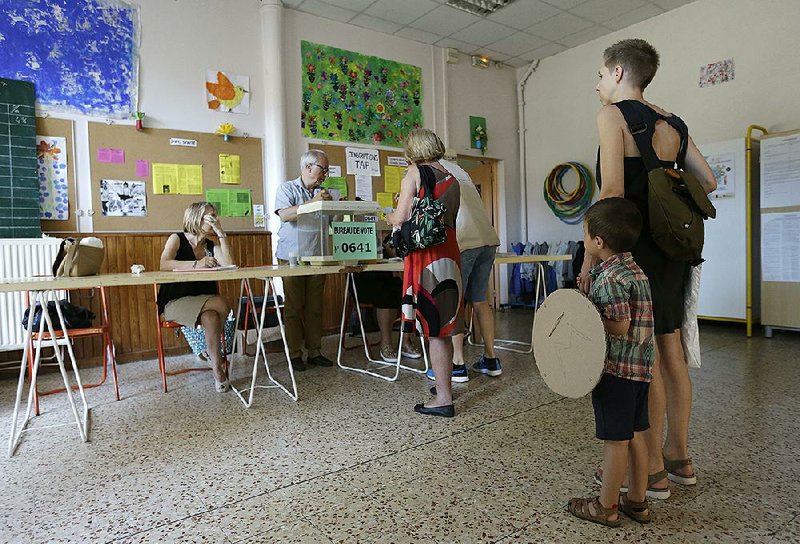PARIS -- French voters gave President Emmanuel Macron's upstart party a solid victory in Sunday's parliamentary election, handing the centrist a strong mandate to reshape French politics and overhaul the country's restrictive labor laws.
Polling agency projections suggested that Macron's Republic on the Move party could take 355 to 365 seats in the 577-seat National Assembly, the powerful lower house. That's far more than the 289 seats needed for an absolute majority to carry out his program.
Prime Minister Edouard Philippe, a center-right politician who joined Macron's movement, said "through their vote, a wide majority of the French have chosen hope over anger."
With 82 percent of the vote counted, the Interior Ministry said Macron's party had 42 percent of the vote, the conservative Republicans had 22 percent and the far-right National Front captured 10 percent. The Socialists, who ruled the nation before Macron's independent presidential victory in May, were decimated and only won 6 percent of the vote.
Republican leader Francois Baroin declared his party the main opposition and wished Macron "good luck" because he said he wants France to succeed. He said conservative lawmakers are going to have a strong bloc in the lower house to be able to voice their views.
However, some opponents vowed to do their best to counter Macron's plans.
National Front leader Marine Le Pen registered an overwhelming victory in her northern bastion of Henin-Beaumont, defeating Macron's candidate as she won her first French parliamentary seat. Le Pen was handily defeated by Macron in the May 7 presidential vote.
Le Pen said she would "fight with all necessary means the harmful projects of the government," especially what she called Macron's pro-European, pro-migrant policies. She said her National Front party had won at least six seats -- with not all votes counted -- an increase from the two seats it held in the outgoing legislature.
Ultra-leftist Jean-Luc Melenchon, who Macron also defeated in the presidential vote, said he won in his Marseille district. Melenchon, whose party was projected to win 25 to 30 seats, denounced Macron's planned labor reforms that would make it easier to hire and fire French workers, calling them a "social coup d'etat" that he would fight.
Voters overall showed little enthusiasm for the election, which could see record low turnout. Experts partly blamed voter fatigue after the May election of Macron, plus voter disappointment with politics.
Confusion also played a role, according to Frederic Dabi of the IFOP polling firm. Macron's party, which didn't exist 14 months ago and offered novice candidates from civilian life for many seats, drew from both the left and right to fill its ranks, effectively blurring the country's traditional political divide.
Macron's party "vampirized" the left and right after his huge win in the presidential ballot, Dabi said on CNews TV.
After a year that saw landmark victories for populist campaigns in both Britain and the United States, Macron's election in May was widely seen as bucking a global trend.
"The French in the majority want to give a chance to Macron," said Dominique Moisi, a foreign policy adviser at the Institut Montaigne, a Paris think tank close to the Macron campaign. "It reflects a judgment of the first weeks in power of Emmanuel Macron.
"They elected him, but they were not sure at first," Moisi added. "But then they saw that he was incarnating the republic better than their previous president."
Shortly after his election, Macron faced off against President Donald Trump in a six-second handshake and publicly criticized his American counterpart's decision to withdraw from the Paris climate accords, inviting -- in fluent English -- American climate scientists and researchers to relocate to France. Then he launched a catchphrase that played with Trump's campaign slogan: "Make Our Planet Great Again."
Several days later, Macron stood in the Palace of Versailles outside Paris next to Russian President Vladimir Putin. Instead of making nice, the 39-year-old French president used the subsequent news conference to blast Russia's state-owned media outlets, such as Sputnik and Russia Today, as "organs of influence and propaganda."
But at the same time, France's 2017 elections, which concluded Sunday with the second and final round of voting for parliamentary candidates, reached a different sort of historic mark as well: Never before has voter abstention been so high, at roughly 58 percent, according to one projection.
After a crushing defeat, Jean-Christophe Cambadelis resigned Sunday from his post as head of the Socialist Party, which dominated the outgoing assembly but was flattened by the unpopularity of former President Francois Hollande.
He said the Socialist Party needs to change its ideas and its organization and that a "collective leadership" will replace him. With its allies, the Socialists could get fewer than 50 seats after this vote, projections showed.
"Emmanuel Macron's triumph is uncontestable, the defeat of the left is unavoidable, and the defeat of the Socialist Party is irrevocable," Cambadelis said.
German Chancellor Angela Merkel said she is looking forward to continuing her cooperation with Macron, while Foreign Minister Sigmar Gabriel said in a Twitter posting that Sunday's vote paves the way for reforms in France. European Commission President Jean-Claude Juncker posted a letter he sent to Philippe that said the results show "a resolutely modern France that's determined to take part in a strong European future."
"The French wanted to give a clear majority to the president, and it's done. I congratulate him," Republican leader Francois Baroin said. "We have a strong enough group to be heard, to defend our interests and make our differences clear."
Information for this article was contributed by Elaine Ganley, Sylvie Corbet, Philippe Sotto and Geir Moulson of The Associated Press; by James McAuley of The Washington Post; and by Gregory Viscusi, Helene Fouquet, Geraldine Amiel and Mark Deen of Bloomberg News.
A Section on 06/19/2017
